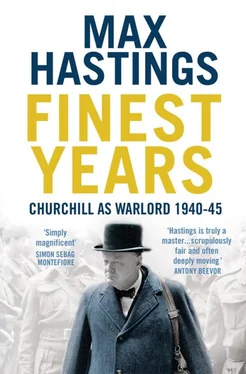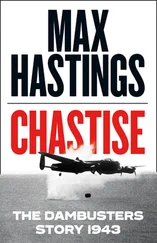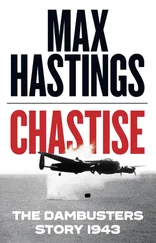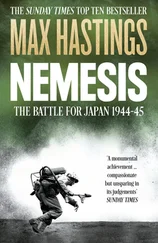Much discussion of Britain’s military effort in World War II focuses upon Churchill’s relationship with his generals. In my view, this preoccupation is overdone. The difficulties of fighting the Germans and Japanese went much deeper than could be solved by changes of commander. The British were beaten again and again between 1940 and 1942, and continued to suffer battlefield difficulties thereafter, in consequence of failures of tactics, weapons, equipment and culture even more significant than lack of mass or inspired leadership. The gulf between Churchillian aspiration and reality extended to the peoples of occupied Europe, hence his faith in ‘setting Europe ablaze’ through the agency of Special Operations Executive, which had malign consequences that he failed to anticipate. SOE armed many occupied peoples to fight more energetically against each other in 1944-45 than they had done earlier against the Germans.
It is a common mistake, to suppose that those who bestrode the stage during momentous times were giants, set apart from the personalities of our own humdrum society. I have argued in earlier books that we should instead see 1939-45 as a period when men and women not much different from ourselves strove to grapple with stresses and responsibilities which stretched their powers to the limit. Churchill was one of a tiny number of actors who proved worthy of the role in which destiny cast him. Those who worked for the prime minister, indeed the British people at war, served as a supporting cast, seeking honourably but sometimes inadequately to play their own parts in the wake of a titan.
Sir Edward Bridges, then Cabinet Secretary, wrote of Churchill between 1940 and 1942: ‘Everything depended upon him and him alone. Only he had the power to make the nation believe that it could win.’ This remains the view of most of the world, almost seventy years later. Yet there is also no shortage of iconoclasts. In a recent biography Cambridge lecturer Nigel Knight writes contemptuously of Churchill: ‘He was not mad or simple; his misguided decisions were a product of his personality—a mixture of arrogance, emotion, self-indulgence, stubbornness and a blind faith in his own ability.’ Another modern biographer, Chris Wrigley, suggests that Sir Edward Bridges’ tribute to Churchill ‘may overstate his indispensability’.
Such strictures seem otiose to those of us convinced that, in his absence, Britain would have made terms with Hitler after Dunkirk. Thereafter, beyond his domestic achievement as war leader, he performed a diplomatic role of which only he was capable: as suitor of the United States on behalf of the British nation. To fulfil this, he was obliged to overcome intense prejudices on both sides of the Atlantic. So extravagant was Churchill’s—and Roosevelt’s—wartime rhetoric about the Anglo-American alliance, that even today the extent of mutual suspicion and indeed dislike between the two peoples is often underestimated. The British ruling class, in particular, condescended amazingly towards Americans.
In 1940-41, Winston Churchill perceived with a clarity which eluded some of his fellow countrymen that only American belligerence might open a path to victory. Pearl Harbor, and not the prime minister’s powers of seduction, eventually brought Roosevelt’s nation into the war. But no other statesman could have conducted British policy towards the United States with such consummate skill, nor have achieved such personal influence upon the American people. This persisted until 1944, when his standing in the US declined precipitously, to revive only when the onset of the Cold War caused many Americans to hail Churchill as a prophet. His greatness, which had come to seem too large for his own impoverished country, then became perceived as a shared Anglo-American treasure.
From June 1941 onwards, Churchill saw much more clearly than most British soldiers and politicians that Russia must be embraced as an ally. But it seems important to strip away legends about aid to the Soviet Union, and to acknowledge how small this was in the decisive 1941-42 period. Stalin’s nation saved itself with little help from the Western Allies. Only from 1943 onwards did supplies to Russia gain critical mass, and Anglo-American ground operations absorb a significant part of the Wehrmacht’s attention. The huge popularity of the Soviet Union in wartime Britain was a source of dismay, indeed exasperation, to the small number of people at the top who knew the truth about the barbarity of Stalin’s regime, its hostility to the West, and its imperialistic designs on Eastern Europe.
The divide between the sentiments of the public and those of the prime minister towards the Soviet Union became a chasm in May 1945. One of Churchill’s most astonishing acts, in the last weeks of his premiership, was to order the Joint Planning Staff to produce a draft for Operation Unthinkable . The resulting document considered the practicability of launching an Anglo-American offensive against the USSR, with forty-seven divisions reinforced by the remains of Hitler’s Wehrmacht, to restore the freedom of Poland. Though Churchill recognised this as a remote contingency, it is remarkable that he caused the chiefs of staff to address it at all.
I am surprised how few historians seem to notice that many things which the British and Americans believed they were concealing from the Soviets—for instance, Bletchley Park’s penetration of Axis ciphers and Anglo-American arguments about launching a Second Front—were well known to Stalin, through the good offices of communist sympathisers and traitors in Whitehall and Washington. The Soviets knew much more about their allies’ secret policy-making than did the British and Americans about that of the Russians.
It is fascinating to study public mood swings through wartime British, American and Russian newspapers, and the diaries of ordinary citizens. These often give a very different picture from that of historians, with their privileged knowledge of how the story ended. As for sentiment at the top, some men who were indifferent politicians or commanders contributed much more as contemporary chroniclers. The diaries of such figures as Hugh Dalton, Leo Amery and Lt.Gen. Henry Pownall make them more valuable to us as eye-witnesses and eavesdroppers than they seemed to their contemporaries as players in the drama.
Maj.Gen. John Kennedy, for much of the war the British Army’s Director of Military Operations, kept a diary which arguably ranks second only to that of Gen. Sir Alan Brooke for its insights into the British military high command. On 26 January 1941, in the darkest days of the conflict, Kennedy expressed a fear that selective use of accounts of the meetings of Britain’s leaders might mislead posterity:
It would be easy by a cunning or biased selection of evidence to give the impression for instance that the P.M.’s strategic policy was nearly always at fault, & that it was only by terrific efforts that he is kept on the right lines—and it would be easy to do likewise with all the chiefs of staff. The historian who has to deal with the voluminous records of this war will have a frightful task. I suppose no war has been so well documented. Yet the records do not often reveal individual views. It is essentially a government of committees…Winston is of course the dominating personality & he has in his entourage and among his immediate advisers no really strong personality. Yet Winston’s views do not often prevail if they are contrary to the general trend of opinion among the service staffs. Minutes flutter continually from Winston’s typewriter on every conceivable subject. His strategic imagination is inexhaustible and many of his ideas are wild and unsound and impractic-able…but in the end they are killed if they are not acceptable.
Читать дальше












